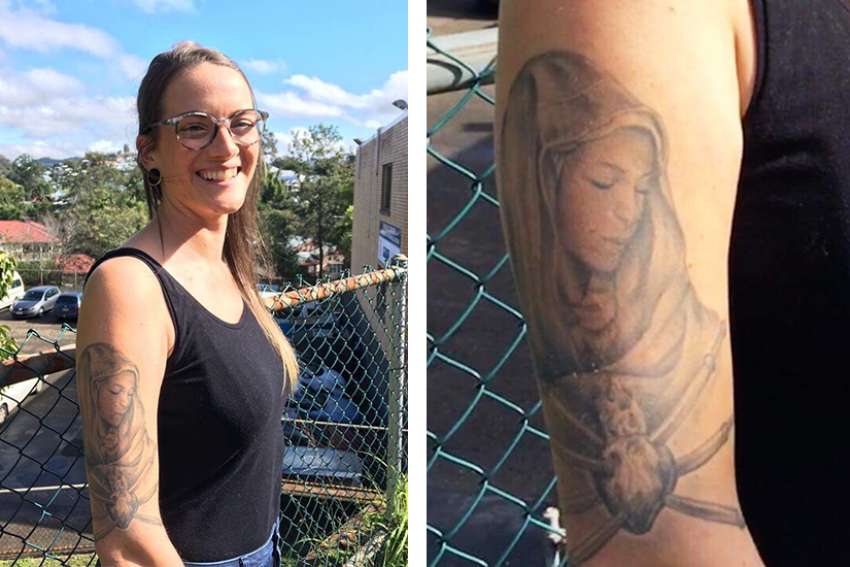She even worked with an artist friend to work on just the right design of an image Our Lady of Sorrows that would permanently cover her upper right arm. She said to some, it might look sacrilegious, but it reminds her to live as Mary did in faith and joy.
“Even in her sorrow, losing Jesus, fleeing her home, watching her son die… she still looked out of herself,” says Fradd, 28-year-old recruiting coordinator for NET Australia and former missionary for NET Canada. “You can really turn your suffering into a gift in some way.”
As more young people incorporate tattoos as signs of devotion to their faith, there are just as many who raise an eyebrow at inking religious imagery onto their bodies. One recent U.S. poll suggested almost half of millennials (ages 18-35) have tattoos.
The Catholic Church has not made a formal decision or teaching in this matter and the Catechism of the Catholic Church does not say anything about tattoos.
The New Testament doesn’t rule on tattoos, though a common argument against tattoos makes reference to Leviticus 19:28 in the Old Testament that says: “You shall not make any cuttings in your flesh on account of the dead or tattoo any marks upon you: I am the Lord.”
However, this passage was meant to discourage ancient pagan mourning rituals of its day. Much later, the Church’s catechism talked about respecting our bodies, but never directly opposed the act of getting a tattoo. Of course, while they are not regarded as sinful, they could be if they contradict or malign the faith.
While the latest jump in tattooing has rekindled the debate over their suitability in religious terms, there was no question in Fr. Robert Mignella’s mind when he got his tattoos earlier this year.
On one arm is a combination of calla lilies (which he often sees in his ministry at weddings and funerals), a cross and the letters RAFH. It’s an acronym for “Reaching Always For Him.” The other arm has a shortened version of Psalm 63:6: “...on you I muse through the night.” It’s part of an old morning prayer that he said while in the seminary.
Some of his parishioners at St. Marguerite D’Youville Parish in Brampton, Ont., gave Mignella confused looks when he first got his tattoos, but he said images are compelling to him, and the Church actually has a history of permanent imagery.
He noted that Mary “tattooed” herself on a tilma in Guadalupe. The shroud of Turin — believed to be Christ’s face imprinted on it — is another example. He said even the sacraments could be seen as spiritual markings.
“One can make the spiritual parallel that baptism, confirmation (and) ordination are these indelible marks left on the soul (that) are also, in the spiritual realm, permanent tattoos,” he said.
“I think personally if you’re Catholic and you want a tattoo, it just boils down to prudence,” says 18-year-old Cassidy Constantin.
With a small crusader cross on his forearm, Constantin has a constant symbol of what he believes.
Like Fradd, he spent time looking at different designs and considering what he wanted. “I just figured, if I was going to get one, it might as well be something that kind of represents who I am and what I believe,” he said.
(Gilmor, 20, is a second-year journalism student at Ryerson University in Toronto.)


